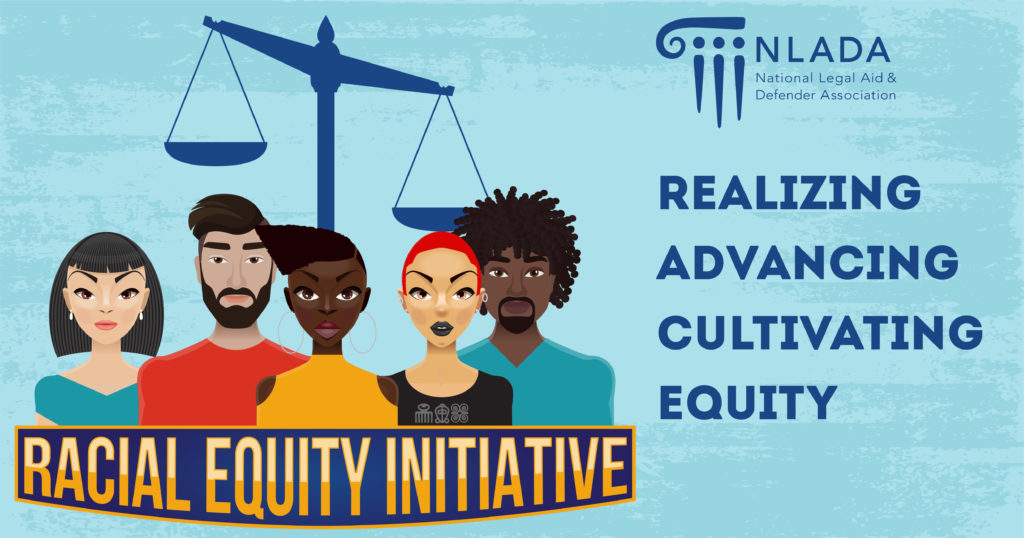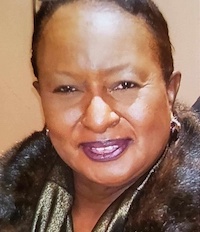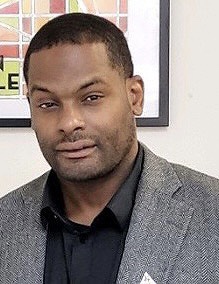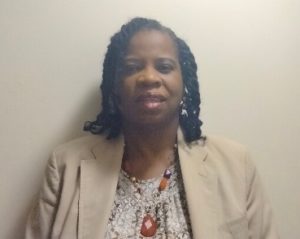
NLADA’s commitment to racial equity is more than the work that we do; it’s also the impact that it has on members of the NLADA community. From presentations at Annual Conference to the REI-DEI Fellowship to the REI-DEI Coffee Hour, the Racial Equity Institute engages with all members of the NLADA community. Together, we work to move the needle forward on race and equity on an individual, institutional, and systemic levels.
In Their Words, is an opportunity to learn how the REI impacts the NLADA community from our members.
2022 REI-DEI Fellows: In Their Own Words, “You Don’t Have to be One of to Stand With”
By LaShung Willis, REI-DEI Fellow
 The NLADA Racial Equity & Inclusion REI-DEI Fellowship program provides an opportunity for me to build relationships with a diverse team of individuals, including some I may not have known about. Collaborating with members of the defender, civil, client/community advocate, and private sector allows me to gain deeper insight into DEI issues from more excellent dimensions. This matches my value, “You don’t have to be one of to stand with.” It is essential to continue supporting or helping someone/anyone different from you who is in a difficult DEI situation.
The NLADA Racial Equity & Inclusion REI-DEI Fellowship program provides an opportunity for me to build relationships with a diverse team of individuals, including some I may not have known about. Collaborating with members of the defender, civil, client/community advocate, and private sector allows me to gain deeper insight into DEI issues from more excellent dimensions. This matches my value, “You don’t have to be one of to stand with.” It is essential to continue supporting or helping someone/anyone different from you who is in a difficult DEI situation.
This training supports current DEI initiatives and provides a comprehensive focus to enable the development of more inclusive and equitable organizational cultures. The training facilitators and experts share validated historical data, valuable videos, and articles and hold discussions they can incorporate into developing quality DEI initiatives. The training sessions allow time to share lived experiences and engage with other Fellows further to develop DEI knowledge, skills, and core competencies. The program supports the importance of having a voice that influences the DEI strategic direction of an organization. It has been stated, and I believe, that doing the work of DEI is the right thing to do. As an educator, I will continue to engage others, expand their knowledge, and promote the advancement of REI-DEI for individuals and organizations.”
REI-DEI Fellows: In Their Own Words, “DEI Should Not be One-Side”
By Talib Shakir, REI-DEI Fellow
 My name is Talib Shakir, and I am a fellow of the REI-DEI inaugural class of 2022. I want to take the time to talk about what I am a fellow, what I am learning, and what it means to me to be a part of such a historic opportunity.
My name is Talib Shakir, and I am a fellow of the REI-DEI inaugural class of 2022. I want to take the time to talk about what I am a fellow, what I am learning, and what it means to me to be a part of such a historic opportunity.
I am a native Washingtonian and proud to be part of this fellowship. I chose to partake in this course because the dynamics of Washington, DC, are ever-changing. In my work at a DC government office, it is essential that I approach my work using an REI/DEI lens. What I have learned thus far is the importance of language. I am learning how my language stems from my belief system and race relations. I was doing the work by calling out obvious racial insensitivities. I was not focused on what inclusion and diversity looked like to others who may not look like me. So, while I was championing the call for black and brown people, I could not identify and see those who may come from other minority groups.
This course has taught me that we must be open to addressing our personal biases and consider that racism, sexism, and gender bias are unfair and should not be tolerated. The role of DEI should not be one-sided but should include any and every injustice that makes people feel unheard, unsafe, and marginalized.
I have felt safe and supported every step of the way. These are not easy topics, and everyone has a different understanding, from their personal experiences, of what should be at the top of the list. The diversity in the group has helped me and others see that there is a bigger picture to ensuring that all people are heard and feel that they are in a safe space. I am forever grateful and appreciative of this opportunity to be a part of this fellow and to have gained the knowledge I have thus far.
I look forward to the completion of the course and the upcoming classes. I will continue learning and growing every step of the way.
At NLADA’s Annual Conference, besides providing a racial equity lens choosing workshops, Keri Nash led three sessions: Client Session: Listening Session & Work Plan, Launching DEI Initiatives, and DEI Coffee Hour: Let’s Get Connected! During the pre-conference, Keri engaged with members of the client community like Suzanne Small, who wrote this piece for the REI eNewsletter!
In Their Own Words: Leadership Training at Annual Conference
By Suzanne Small
 In October 2022, I had the great opportunity to attend the NLADA Conference, Speaking Truth to Power, A New Day in a New Way. There was a special pre-conference that focused on the Client Advocates. During that pre-conference, I participated in two workshops. First, “Leadership is Everybody’s Business,” by Chuck Wynder and, “So, You are on the Board of Directors, Now What,” by Roderick Bohannan.
In October 2022, I had the great opportunity to attend the NLADA Conference, Speaking Truth to Power, A New Day in a New Way. There was a special pre-conference that focused on the Client Advocates. During that pre-conference, I participated in two workshops. First, “Leadership is Everybody’s Business,” by Chuck Wynder and, “So, You are on the Board of Directors, Now What,” by Roderick Bohannan.
Leadership is Everybody’s Business created a visual of, “Clear Space.” Does our NLADA program provide us with clear space to be the leaders we are, and allow us to be the advocates we are meant to be? Can we speak truth to power? The presenter talked about what he called the five practices of exemplary leadership: It’s everybody’s business, relationship, self-development, learning, and the ongoing process. In summation, leadership is mobilizing others to struggle in a shared aspiration.
As advocates, we continually do our best and stand by our views. We are passionate about the things we believe in, and we stand up for the people we serve. We strengthen our communities, and we have a commitment to alleviate the struggles of marginalized people. We stand together as leaders, and we share in the responsibilities of leadership.
So, You are on the Board of Directors, Now What!, presenter discussed the basic understanding of your role as a board member. It emphasized the right for the client board member to be comfortable and effective on a board of directors. The presenter explained the organization of a non-profit board and a for-profit corporation, and why we need a board of directors like the legal reasons, board accountability, etc.
The presenter also spoke about the relevance of the Robert Rules of Order. These parliamentary rules have helped organizations take a democratic, fair approach to meetings for over 100 years. It was published in 1826 by Henry M. Robert and it allows for maximum fairness for each member while conducting effectively orderly meetings.
We touched upon topics like do you feel you are part of the team as a client board member? Because, you have a right to voice your opinions, ask questions when you don’t understand, and collaborate as a team member.
I found both these workshops to be very engaging and informative. I feel they will help me to be more effective in my role as a board member. The topics were relevant and I enjoyed how the speakers interacted with the group.
Suzanne Small
Greater Boston Legal Services/Volunteer Lawyers Project
Client Board Member
Boston, Massachusetts
We are America’s oldest and largest nonprofit association devoted to excellence in the delivery of legal services to those who cannot afford counsel. There is no other legal organization that touches on all the access points of poverty as does NLADA.